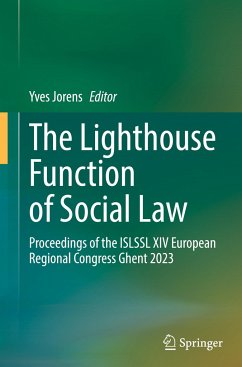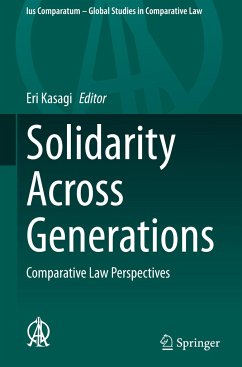
The Lighthouse Function of Social Law
Proceedings of the ISLSSL XIV European Regional Congress Ghent 2023
Herausgegeben: Jorens, Yves
Versandkostenfrei!
Versandfertig in 6-10 Tagen
166,99 €
inkl. MwSt.

PAYBACK Punkte
83 °P sammeln!
This is the conference book for the XIV European Regional Congress of the International Society for Labour and Social Security Law, dedicated to the interactions between social law and other areas of law. In recent years, labour law and social security law have been subject to various reforms and developments. Social law is however not an isolated domain but rather interacts with other fields, often even functioning as a guide or giving direction to those lost at sea. In other words: serving as a lighthouse.The key aspect addressed in this book is the existence of a connection between social l...
This is the conference book for the XIV European Regional Congress of the International Society for Labour and Social Security Law, dedicated to the interactions between social law and other areas of law. In recent years, labour law and social security law have been subject to various reforms and developments. Social law is however not an isolated domain but rather interacts with other fields, often even functioning as a guide or giving direction to those lost at sea. In other words: serving as a lighthouse.
The key aspect addressed in this book is the existence of a connection between social law sensu stricto (labour law and social security law) and other areas of law. Pursuing an inter- and multidisciplinary approach, it gathers contributions on topical and challenging issues in four broad areas:
1. Basic and fundamental principles of European social law
2. The future in the light of the past
3. The impact of regionalisation
4. Enforcementin social law
In turn, various developments can be identified in connection with these topics: the emergence of social criminal law is creating new overlaps between social and criminal law; the growing number of administrative law sanctions offers new insights into and connections between social security law and administrative law; the increasing similarity of employment in the public and private sectors raises questions about the applicability of administrative law in labour law relations; the relation between the ECHR and the articles of the Constitution opens up new perspectives on the constitutional interpretation of freedoms and on the interaction between human rights, constitutional law and social law; and lastly, there is a growing influence of EU law and international treaty law (concerning trade) on social law. Can we, by looking at these developments, draw certain conclusions at a different and innovative level? The contributions were selected by an internationalworking group of distinguished scholars from across Europe.
The key aspect addressed in this book is the existence of a connection between social law sensu stricto (labour law and social security law) and other areas of law. Pursuing an inter- and multidisciplinary approach, it gathers contributions on topical and challenging issues in four broad areas:
1. Basic and fundamental principles of European social law
2. The future in the light of the past
3. The impact of regionalisation
4. Enforcementin social law
In turn, various developments can be identified in connection with these topics: the emergence of social criminal law is creating new overlaps between social and criminal law; the growing number of administrative law sanctions offers new insights into and connections between social security law and administrative law; the increasing similarity of employment in the public and private sectors raises questions about the applicability of administrative law in labour law relations; the relation between the ECHR and the articles of the Constitution opens up new perspectives on the constitutional interpretation of freedoms and on the interaction between human rights, constitutional law and social law; and lastly, there is a growing influence of EU law and international treaty law (concerning trade) on social law. Can we, by looking at these developments, draw certain conclusions at a different and innovative level? The contributions were selected by an internationalworking group of distinguished scholars from across Europe.












